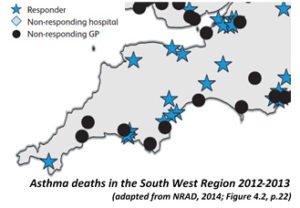Collaboration for Academic Primary Care (APEx) Blog
Collaboration for Academic Primary Care (APEx) Blog
Posted by jchoules
9 January 2018 Despite evidence-based guidelines and effective treatments, more than three people still die from asthma every day in the UK (Asthma UK, 2017). A 2014 National Review of Asthma Deaths report highlights that over three-quarters of deaths from asthma, and many asthma-related hospital admissions, are preventable through improved patient and medical management.
Despite evidence-based guidelines and effective treatments, more than three people still die from asthma every day in the UK (Asthma UK, 2017). A 2014 National Review of Asthma Deaths report highlights that over three-quarters of deaths from asthma, and many asthma-related hospital admissions, are preventable through improved patient and medical management.
Following an asthma death at his practice in Norfolk, I supported a GP colleague with piloting an approach involving adding electronic flags to the records of asthma patients identified as “at-risk” and providing training to practice staff about responding to the flags, for example by facilitating timely access and providing opportunistic management (Noble et al, 2006). In a subsequent “At-Risk Registers In Severe Asthma” (ARRISA) study (Smith et al, 2012) a cluster randomised trial showed that across 29 GP practices this approach had no significant effect on the proportion of patients experiencing moderate-severe asthma exacerbations over 12 months (control: 47%; intervention: 54%). However, this composite outcome masked significant reductions in intervention patients experiencing hospitalisations, smaller reductions in A&E and out-of-hours contacts, plus improvements in prescribing of prednisolone for exacerbations and other aspects of care.
So, an adaptive, practice-level approach to improving management of at-risk asthma patients still appeared promising, but to provide more definitive evidence of effectiveness and cost-effectiveness we are now conducting a larger scale “At-Risk Registers Integrated into primary care to Stop Asthma crises in the UK” (ARRISA-UK) study. This cluster-randomised controlled trial aims to recruit 262 GP practices covering over 9,000 registered at-risk asthma patients across the UK. As previously, the intervention involves identification and flagging records of at-risk patients, but this time with web-based training used to support implementation of practice-wide actions in response to the flags. The study is powered to assess whether the intervention reduces the proportion of at-risk patients experiencing an A&E attendance, hospitalisation or death from asthma over 12 months.
By November 2017 184 practices had been recruited to the study, 10 in the South West, with 31 intervention practices completing the training and implementing flagging. Thank you to all local practices who have supported the study to date! Recruitment is continuing and please contact Tricia Holloway from the Local Clinical Research Network (pholloway@nhs.net), myself (jane.smith@exeter.ac.uk) or the central ARRISA-UK team if you would like further information or your practice is interested in participating. Please also get in touch with any related research ideas!
Dr Jane Smith, Senior Lecturer in Primary Care (jane.smith@exeter.ac.uk)
ARRISA-UK South West Principal Investigator and Process Evaluation lead